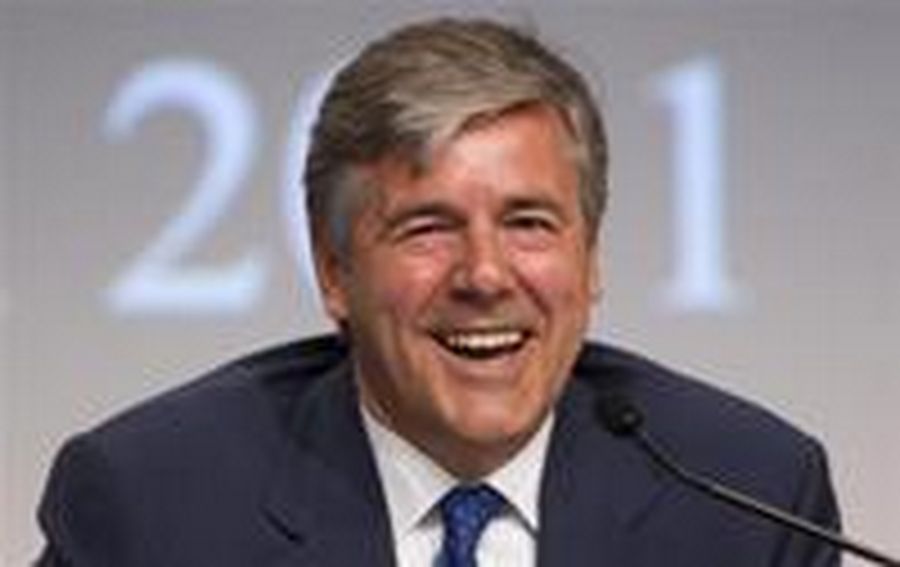
IFR Editor-at-large Keith Mullin
Is it just me or is Josef Ackermann, Deutsche Bank’s outgoing CEO and incoming supervisory board chairman, seeking and achieving a new-found ubiquity? Certainly from the banking side, he’s been pretty much the lone voice in passing judgement on pretty much everything that’s out there at a time when his peers at other major banks have been almost eerily silent (probably watching in horror as their share prices gyrate violently or, depending on the day, crash and burn).
Now as an elder statesman of global banking, chairman of the IIF, advisor-cum-confidant of Angela Merkel and her associates, and still chief executive of Deutsche Bank, Ackermann is hotly sought-after by the world’s media, so he doesn’t need to try too hard. He clearly has valuable opinions on the issues of the day, but my observation around the not-so-subtle recent change is that he’s not at all afraid of voicing them at will.
He seems to be making a concerted attempt to achieve constant press coverage at the moment. His name and his pronouncements are all over Twitter and the blogosphere; he’s speaking openly at conferences and, well, becoming a bit of a media man-about-town.

Deutsche Bank CEO Ackermann attends the annual meeting of the German newspaper Handelsblatt in Frankfurt on Monday (photo: Reuters/Alex Domanski)
Ackermann has voiced strident opposition to Christine Lagarde’s call for urgent bank recapitalisation; he’s (potentially contradictorily) expressed concern about the solvency of European banks if they’re forced to mark sovereign bond positions to market; he came out against the common eurobond; he’s been airing his views on economic growth and on bank profitability; and has been laying down some sound bites about the current market situation. Here are just a few of his recent proclamations, culled from various media:
- [On Lagarde’s call for bank recapitalisation]: “what’s been demanded from well-known figures, that banks face mandatory recapitalisations; I think nothing at all of that.”
- [Suggestions for a forced recapitalisation of European banks are] “of little help … and not justified”. “It would threaten to undermine the credibility of the package [for Greece and other crisis-hit EU states] if politicians were, through forced recapitalisation, to send the signal that they don’t believe that the measures taken will be successful.”
- “Many European banks would not survive having to revalue sovereign debt held on the banking book at market levels.”
- “The risks are back”; banks, particularly in the dollar area, “have become hesitant” to provide liquidity, and long-term financing on the markets is “difficult at the moment.”
- “[Euro bonds are not a] silver bullet.”
- “[Germany and most other European countries will have] “stable growth and I believe we also won’t slip back into recession in the US.”
- Europe’s sovereign debt crisis, its low structural growth and increasing regulation meant it would “be difficult for the European financial sector as a whole to increase its profits.”
- “We should resign ourselves to the fact that the ’new normality’ is characterised by volatility and uncertainty. All this reminds one of the autumn of 2008.”
- “Prospects for the financial sector overall… are rather limited.”
- “The outlook for the future growth of revenues is limited by both the current situation and structurally.”
- “[The banks are the] “servants of the real economy” and the excesses of recent years must be corrected.
The above (with the exception of the slightly odd final one about banks being the servants of the real economy) all seem to be eminently reasonable, But is Ackermann’s new-found media omnipresence part of a Deutsche Bank PR strategy to bed him into his new political role? Or is Joe just, well, sounding off?
(BTW, as for that final sound bite, from the Berlin daily Der Tagesspeigel, unless Ackermann really is a poacher-turned-gamekeeper which I personally doubt, such post-hoc mea culpa posturing looks like a plant designed to appease the anti-investment bank stakeholders that have and will continue to have a voice in the running of the bank).
My final thought is that Ackermann’s grandstanding hasn’t left any room for incoming co-CEO Anshu Jain to build out his new profile, notwithstanding the fact that he won’t be in situ until May 2012. But I’d love to know what Jain makes of the current uncertainty and market distress. While I suspect his personal PR engine is turning over waiting for the right moment, I do wonder if he’ll be able to get a word in edgeways!

